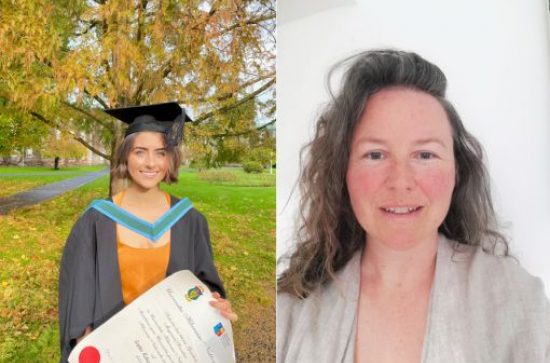
We are delighted to celebrate the recent successes of our graduates across programmes in the Department of Psychology. A list of these prize winners is presented below:
Carmel Staunton Prize for Best Final Year Project
(Awarded for the highest score achieved in the third year Research Project module)
Roisin Devoy
W. J. Smyth Prize for Best Performance in BA (Hons) Psychology
(Awarded for the highest score in the Final year psychology class)
Katy Quinn
Final Year Prize in Psychological Studies
Anna Kuhlmann
Final Year Prize in Psychology Through Science
(Awarded for the highest score in the Final year psychology through science class)
Sinead Waters
Prize for Best Overall Performance, MSc Psychology
Joe Jennings
Prize for the best Research Project, MSc Psychology
Anna Madigan and Sophie Mahon (Joint Winners)
Featured projects
Carmel Staunton Prize Winner, Roisin Devoy:

Effects of a Mindfulness and Movement Based Intervention on Affect and Vitality
Background: Globally, rates of psychological distress are rising, with the World Health Organisation declaring depression the leading cause of disability. Health inequalities, inadequate health services and growing waiting lists compound the problems. The traditional medical approach to treating psychological distress is limited. Thus, the number of people using, and health professionals recommending complementary and alternative medicine (CAM) for improving self-management, and wellbeing has increased. Mindfulness and movement approaches (yoga and tai chi), are widely researched and accepted wellbeing interventions. However, there is a lack of research comparing the effects of different interventions. High dropout rates, time and financial barriers to participation suggest a need for readily accessible, self-administered interventions. Method: Sixty-two self-selected participants took an online survey, which randomly allocated them to a brief online movement OR mindfulness intervention. The effects of these interventions on wellbeing, mood and vitality were examined. In addition, individual differences in gender, age, frequency of CAM practice, general distress and enjoyment were explored in the ability to predict changes in mood and vitality. Results: Vitality increased in both groups, with the greatest increase in the movement group. Negative mood decreased in both groups, with the greatest decrease in the mindfulness group. Positive mood increased in the movement group and decreased in the mindfulness group. Gender, age, and frequency of CAM practice did not predict changes in mood and vitality, suggesting that both interventions are accessible to a range of people. General distress levels predicted reductions in negative mood and enjoyment predicted increases in positive mood and vitality. Conclusions: Results suggest brief online movement and mindfulness interventions may be useful for self-management and wellbeing. Differences between interventions may be clinically important when treating people with varying needs.
Prize for best MSc Psychology Research Project, Sophie Rebecca Mahon:

Intersectionality and Leadership: understanding the experiences of women in leadership positions in Ireland.
Multiple studies demonstrate that women remain underrepresented in leadership positions. There are numerous causes for this, including socialisation, workplace discrimination, and a lack of workplace support for women. The majority of research in this field excludes diverse female leaders and neglects to examine the impact of intersectionality on women's leadership experiences. Intersectionality refers to the interconnectedness of social categories such as race, class, and gender, as well as the manner in which their overlap generates differences in experience, opportunity, discrimination, and disadvantage. Consequently, individuals who struggle with the intersectionality of two or more inextricably intertwined social identities are ignored and marginalised. The purpose of this research was to fill this gap in the literature by investigating the lived experiences of women in leadership positions within the Irish cohort, with a particular focus on exploring the role of intersectionality in these experiences. For this purpose, we conducted 30-minute semi-structured interviews with 16 women who self-identified as diverse female leaders. These women were asked about their backgrounds and leadership experiences, as well as any obstacles they may have encountered along their leadership journey. The findings demonstrated that women in leadership positions face significant socialisation, discrimination, and bias. It was found that the intersectionality of gender and class and gender and motherhood exacerbated these factors. In this study, working-class women and mothers revealed a deeply rooted societal problem by describing the additional discrimination, lack of opportunity, and lack of support they face as a result of the interaction of two social identities. The results demonstrate how intersectionality negatively affects the leadership experiences of women. In addition, they emphasise the need for additional research in this area to fully comprehend how other social identities, which are inextricably linked, influence an individual's leadership experience.
Joint winner of Best MSc Psychology Research Project, Anna Madigan:

Examining Subjective Social Status and Depression and Suicidality in the United States
Examining Subjective Social Status and Depression and Suicidality in the United States
Low socioeconomic status (SES) is understood to be an established risk factor of both depressive symptoms and suicidality. Subjective social status (SSS), defined as how an individual perceives their position within the social hierarchy has also been theorised to affect an individual’s mental health, however less is understood about the exact role it plays. The current study aimed broaden the research surrounding the impact of an individual’s SSS on their mental health, by examining the association between SSS and both depressive symptoms and suicidality over various time periods of individual’s lives. Moreover, this study aimed to explore whether the relationship between SES and these mental health outcomes was mediated by SSS. Mediation is a process whereby an independent variable (X), causes a mediating variable (M), which causes a dependent variable (Y). This study used nationally representative data gathered from The National Longitudinal Study of Adolescent to Adult Health (Add Health). This study focused on participants from Wave IV (n= 5,114) and Wave V (N= 4,196) of this data set exclusively. Participants’ SSS and SES, along with demographic covariates (age, sex, race) were tested for cross-sectional, prospective, and longitudinal associations with depressive symptoms, suicidal ideation and suicide attempts. The results of this study found both SES and SSS to be predictors of depressive symptoms and suicidality. Furthermore, SES was found to be linked to midlife depressive symptoms and suicidality through the mediating effect of SSS. These findings make significant contributions to understanding the long-term effects of SSS, as well as provide clarification of the mechanism through which low SES forecasts the development of depressive symptoms and suicidality.
